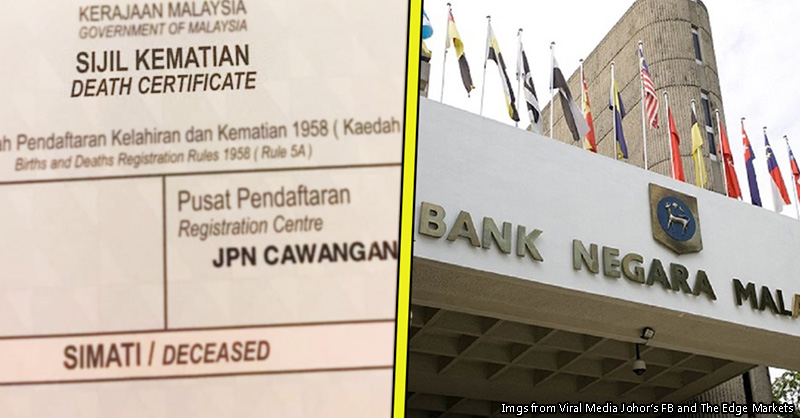Can Malaysian banks come after you to collect your dead relative’s hutang?

- 101Shares
- Facebook47
- Twitter7
- LinkedIn9
- Email12
- WhatsApp26
Can Malaysian banks come after you to collect your dead relative’s hutang?Note: The article below applies to non-Muslim succession matters. Muslim succession matters will be governed by Syariah laws.
During a person’s life, they might accumulate wealth to leave behind to their children when they pass away one day.
However, they may also do the reverse: accumulate debt through credit cards, bank loans, or even loan sharks. This debt can also be left behind when they die, so now you might be wondering… if one of your family members leave you with their debt one day, what can you do about it?
Spoiler: The debt will not be wiped out

When a person dies, they leave behind their estate, which is fancy legal speak for the assets they have. If they have a will, then matters relating to their estate (including their debt) will already be specified in there, so just follow lo. If they don’t have a will, however, they are known as an intestate, and the court will appoint someone to handle their matters. They will also issue something called a Letter of Administration, which is kind of like a will but the court decides who manages the deceased’s assets.
In either case, someone will be put in charge of the deceased’s matters, and this person is called the executor. Besides distributing the deceased’s wealth to their next of kin, the executor will also handle their debts, clearing them as needed.

So let’s say that one of your family members die, and you’re appointed as their executor. While you need to be responsible for their debt, it doesn’t mean that you ‘inherit’ their debt personally – the debt won’t be transferred to your name, and you won’t have to use your own money to pay the debtors. Instead, you’re more like the manager, using whatever the deceased left behind to clear their debt.
This could mean using whatever money they left behind to pay off their hutang, and if they don’t have that, selling off their property to do so. So if the deceased left money and a house to their children, there’s a chance their children won’t get the full inheritance – the executor will have to settle the deceased’s debt first before distributing what’s left.
But what if the deceased only has debt and left nothing to pay it with?
The creditor can choose waive the debt

If there aren’t any assets left, technically, the creditors cannot ask anything else from the next of kin. By right, the debt should be written off at this point. They might ask the next of kin to fork out money to pay up, but they can’t actually demand for this and there are only certain circumstances where a person can be forced to pay someone else’s debt:
- if they co-signed the deceased’s loan
- if they were a guarantor for the loan
But if the family is still being asked to pay, they can appeal to the creditors to reduce or even waive the debt. There’s no law that prevents a creditors from doing this, so they can exercise their own discretion, especially if the family is financially struggling or they had no idea that the deceased had such debts.
If the deceased had signed a contract when taking the loan, there might be a clause which could clear the debt in some circumstances. That clause, if applicable, may help family members who are stuck with a huge amount of debt.
Understandably, all of this might not apply to loan sharks or other illegal creditors. They might still demand payment regardless of what’s happened, and it would be difficult to get out if they start chasing you. But what if you try to prove that you had nothing to do with the deceased?
Can you ‘disown’ family members to avoid paying their debt?
Let’s say that you have been cut off from a family member for years, but you’re their only next of kin when they pass away. Suddenly, you’re getting calls from loan sharks and other creditors who are demanding payment.

In summary, there’s no straightforward way of doing this, but you can file a police report and publicly announce (in newspapers, etc.), that you are disowning that family member. However, for this to happen, the family member has to agree to it, and for that, they have to be alive, of course. Therefore, unfortunately, you cannot cut off ties with a family member after they’ve passed on.
So if you’ve been hit with the debt of a long-lost family member, you should contact the executor (if it was someone else) and let them know to settle the debt. However, if the deceased had taken loans through other means and those parties keep threatening and harassing you, you’ll need to contact the police for assistance.
[This article was originally published on Asklegal.my. Despite being a popular legal resource for the general public, a legal site isn’t particularly attractive for sponsored content clients.
Purely for financial reasons, we made the difficult decision to shut Asklegal down and host the articles on Cilisos; both to recognize the work put in by the team over the years and because we believe that they’re still beneficial to many Malaysians.]
- 101Shares
- Facebook47
- Twitter7
- LinkedIn9
- Email12
- WhatsApp26
